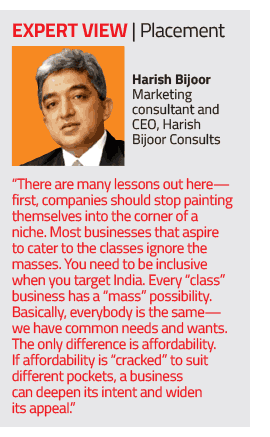How Jawed Habib is Cutting the Right Corners for Profits
- BY Ira Swasti
 In Strategy
In Strategy 16214
16214 0
0

Renowned hairstylist Jawed Habib was always a familiar name among the elite circles of Mumbai and Delhi. Since 2009, he has also become a well-known name among the masses of these metros and several other tier 1 and tier 2 cities in the country. Thanks to the brand’s 104 quick, unisex, dry hair-cutting salons called HairXpresos that have opened across 29 cities in India, the hairstyle brand has brought a premium service to the middle-income consumer group; even as it gives itself an opportunity to enjoy the economic benefits of large volume.

Interestingly, with the HairXpresos, Jawed Habib has turned on its head his flagship brand’s core positioning. So, unlike its exclusive chain of 179 hair and beauty salons that promise not just a wide range of hair and beauty services but create “personalised services to suit a customer’s personality and life style”, the HairXpresos are usually 12x8x8-feet glass kiosks with three styling chairs that provide limited services ranging from a fast and dry haircut to an express blow dry. The company also claims that the quality of services across all its HairXpresos (whether company-owned or franchised) is standardised as all its hair stylists are graded and certified after they are trained at the company’s own academies.
What really gets the desired visibility and volumes for the brand however, is the strategic placement of these “salon McDonalds”. Mostly located at high-footfall places such as malls, high streets, bus depots and areas near railway stations, the strategic location guarantees the company brisk walk-ins, and gives target customers an easy, quick option to pop in and get their haircut. “Typically a good mall gets around five to seven thousand footfalls during weekdays and eight to 10 thousand during weekends. The number is good enough for us to get the desired average cuts a day,” says Rohit Arora, executive director of Jawed Habib Hair and Beauty.

He asserts further that they were encouraged by the easy adoption of the concept despite the fact that many people thought that conservative customers might not accept unisex, see-through glass boxes in public places as an ideal place for a private haircut.
The Indian consumer has evolved over the years as the retail boom has made them more educated and experimental, Arora says. "Daily essentials are being shopped by men and women equally and more frequently and hence the acceptance of men in the marketplace [has increased]. Since our service is only a haircut, it’s okay to get it done within transparent glass walls especially since the unisex format has become common in gyms, clubs and even swimming pools today."
In fact, it was Habib’s understanding of his consumers over the past two decades that triggered the idea of such hair kiosks. “Jawed realised that people’s hectic lifestyles don’t allow them much time. Getting a good quality haircut at affordable price, and to do so in a jiffy is a real winner then,” Arora says. Because HairXpresos are a value-for-money model with haircuts priced at a flat `99, their location is a prime parameter for the unique business model to make profits. In fact, the company has entered into an exclusive deal with mega retailers such as Big Bazaar and Star Bazaar for exclusive hair kiosks. It’s a win-win for both brands—HairXpresos get a captive audience, and family retailers like Big Bazaar are able to expand their repertoire of services for customers by having such facilities onsite.
Jawed realised that people’s hectic lifestyles don’t allow them much time. Getting a good quality haircut at affordable price, in a jiffy is a real winner then." - Rohit Arora
Such partnerships have thus enabled HairXpresos to maintain their competitive edge because it would be impossible for other salons to imitate and keep their price tag low if they had to pay high rents for these sites. “Typically, a good location commands a good rent and if your rent consumes most part of your revenue, it’s a big concern for the business,” explains Arora.
The fast-haircut concept has worked well for a generation that does not have the time to pamper itself regularly and for the team at Jawed Habib hair salons, which is already scouting for more cities to open new HairXpresos.“Consumers in Tier Two and Tier Three cities emulate the metros, which means our unisex format has good chances of being successful there.”





























Add new comment